|
|
|
Sort Order |
|
|
|
Items / Page
|
|
|
|
|
|
|
| Srl | Item |
| 1 |
ID:
109984
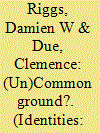

|
|
|
|
|
| Publication |
2011.
|
| Summary/Abstract |
Much of the existing research examining the acquisition of English language skills amongst refugees and other newly arrived migrants, both in Australia and internationally, assumes a relatively straightforward relationship between English language proficiency and inclusion within the broader community. This article presents contrary findings from a study of two South Australian primary schools with New Arrivals Programmes (NAPs). By examining data from both a questionnaire administered to teachers and ethnographic observations of children at play in the school yard, the findings presented here suggest that students in NAPs will be differentially invested in learning English according to the degree of exclusion they experience in the school environment and the impact this has upon their perception of the value of learning English as a mode of engagement. In response, the article calls for an approach to education that is situated in global contexts of colonisation and power relations, and where the terms for inclusion of NAP students are mutually negotiated, rather than predetermined.
|
|
|
|
|
|
|
|
|
|
|
|
|
|
|
|
| 2 |
ID:
173831
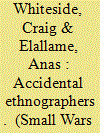

|
|
|
|
|
| Summary/Abstract |
The disillusionment with U.S.-led counter insurgent efforts to gain a deeper understanding of social dynamics in countries with extensive tribal structures has led to a rejection of programs aimed to improve cultural competency. The Islamic State movement does not share this perception, and its strategists blamed its early failures during the U.S. occupation on a flawed understanding of tribal dynamics. This paper traces the political, ideological, and structural changes the leaders of the Islamic State movement made to adapt its approach toward the Sunni tribes of Iraq and later Syria, in order to develop a deeper base of popular support for its caliphate project. The group’s study of the tribes was done by a new tribal engagement office that put into motion an ethnographic study of tribal networks in key areas. There is evidence that the inspiration for this change came from its opponents. The Islamic State movement used these new insights to win a greater level of influence in rural areas, which in turn influenced its success in 2014. This research supports the idea that insurgency and counterinsurgency success often depend on which side is best at the incorporation of cultural and societal knowledge into policy and strategy.
|
|
|
|
|
|
|
|
|
|
|
|
|
|
|
|
| 3 |
ID:
188595
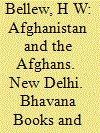

|
|
|
|
|
| Publication |
New Delhi, Bhavana Books and Prints, 2000.
|
| Description |
iv, 212p.hbk
|
| Contents |
Vol. 2: An inquiry into the ethnography of Afghanistan.
|
| Standard Number |
818650527X
|
|
|
|
|
|
|
|
|
|
|
|
Copies: C:1/I:0,R:0,Q:0
Circulation
| Accession# | Call# | Current Location | Status | Policy | Location |
| 060276 | 958.1/BEL 060276 | Main | On Shelf | General | |
|
|
|
|
| 4 |
ID:
113895


|
|
|
|
|
| Publication |
2011.
|
| Summary/Abstract |
In this introduction, we outline the general conceptual framework that ties the various contributions to this special issue together. We argue for the importance of anthropology to "take on" mobility and discuss the advantages of the ethnographic approach in doing so. What is the analytical purchase of mobility as one of the root metaphors in contemporary anthropological theorizing? What are the (dis)advantages of looking at the current human condition through the lens of mobility? There is a great risk that the fast-growing field of mobility studies neglects different interpretations of what is going on, or that only patterns that fit the mobilities paradigm will be considered, or that only extremes of (hyper)mobility or (im)mobility will be given attention. The ethnographic sensibilities of fieldworkers who learn about mobility while studying other processes and issues, and who can situate movement in the multiple contexts between which people move, can both extend the utility of the mobilities approach, and insist on attention to other dynamics that might not be considered if the focus is first and last on (im)mobility as such. In this special issue, we do not want to discuss human mobility as a brute fact but rather analyze how mobilities, as sociocultural constructs, are experienced and imagined.
|
|
|
|
|
|
|
|
|
|
|
|
|
|
|
|
| 5 |
ID:
117196
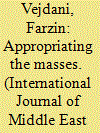

|
|
|
|
|
| Publication |
2012.
|
| Summary/Abstract |
This paper traces the emergence of folklore studies and ethnography in interwar Iran. It argues that these disciplines were part of larger nationalist projects of representing and speaking for the "masses." The first part of the paper explores how and why a number of Iranian intellectuals engaged in folklore studies after a period of prolonged political activism in the first few decades of the 20th century. The second part of the paper examines cultural institutions established by the state, mainly in the late 1930s, in an attempt to appropriate and institutionalize folklore studies and ethnography for the purposes of nation building. These efforts were fraught with ambivalences because the "masses" were simultaneously praised as repositories of "authenticity" and looked down upon as a potential source of "backwardness."
|
|
|
|
|
|
|
|
|
|
|
|
|
|
|
|
| 6 |
ID:
189030
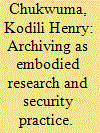

|
|
|
|
|
| Summary/Abstract |
This article explores the importance of embodiment in (research on) archival practices on state counter-terrorism policy in Nigeria. In doing so, the article seeks to contribute to the ongoing discussion around methodology and methods in critical security studies and other related fields in international relations by focusing on (researchers’) bodies as sites of knowledge production and intervention. Building on three empirical themes of fragmentation, labelling and gatekeeping that emerged from fieldwork in Abuja, Nigeria, I demonstrate how embodiment operates in active research contexts in the production – and problematization – of in/security. To do this, I draw inspiration from ideas around state archival practice; embodiment in critical security studies, especially as discussed in feminist and postcolonial work; and in/security theory to scaffold my broader methodological approach. A focus on embodiment, the article argues, marks the researcher’s body – and research – as integral to the development of theories and findings about security. At the same time, exploring the ways in which the (researcher’s) body is (re)produced in relation to identity and subjectivity encourages greater reflexivity in our research practice and fieldwork, as we are continually reminded that our work and our words are grounded in the standpoints that we occupy. The article concludes by identifying some useful strategies from my fieldwork for grappling with the challenges and tensions that emerge from bodily encounters in (security) research process.
|
|
|
|
|
|
|
|
|
|
|
|
|
|
|
|
| 7 |
ID:
168478
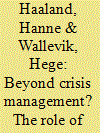

|
|
|
|
|
| Summary/Abstract |
In recent years, what has been called citizen initiatives for global solidarity (CIGS) have grown considerably in numbers across Europe and beyond. Lately, CIGS have also received attention as they are responding to humanitarian crisis across the world. In Europe during 2015, citizens were heavily involved in catering for incoming refugees, putting up loosely organised voluntary-based initiatives. CIGS popped up in places such as Lesvos, which is the focus of our research. Humanitarian CIGS are quick in their response to needs on the ground, are quickly governed by rules and regulations as well as overall ideas about crisis management, and come to work either with or in opposition to other actors. We examine two examples of CIGS positioned at the margins of the humanitarian aid machinery in Lesvos. Through a lens of power and resistance, we discuss how they resisted paradigmatic ideas of crisis management and instead called for a different interpretation of how to think about and do crisis management.
|
|
|
|
|
|
|
|
|
|
|
|
|
|
|
|
| 8 |
ID:
188402
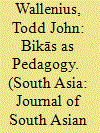

|
|
|
|
|
| Summary/Abstract |
Through the lens of an elite boarding school, this paper seeks to explore afresh the education–development nexus in Nepal. Moving beyond post-modern critiques of the development–schooling nexus, the paper draws on a historical understanding of development and concomitant notions of progress as emerging from earlier contacts between Nepali elites and the West. Combining this historical perspective with six months of ethnographic research at an elite boarding school in Nepal, the paper argues that the concept of development refers to the education of the individual through an emphasis on consciousness, self-discipline and character-building. This personalisation of bika¯
s operates as a holistic pedagogy that facilitates students’ embodiment of the national project through moral, physical and psychological progress.
|
|
|
|
|
|
|
|
|
|
|
|
|
|
|
|
| 9 |
ID:
085401
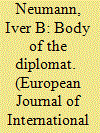

|
|
|
|
|
| Publication |
2008.
|
| Summary/Abstract |
Over the past two decades, the body has emerged as an increasingly important focus of study in the social sciences generally, but little work has been done on it in International Relations. Drawing on a disparate yet voluminous literature on gender, as well as on Bourdieu's analysis of class, this article demonstrates the importance of gendered and classed bodies within the Norwegian Ministry of Foreign Affairs (MFA). Part one, which is based on archival work and interviews, details the emergence of women within the diplomatic service. In part two, which is based on interviews and ethnographic data, I postulate the existence of three masculinity scripts and three femininity scripts within MFA discourse.
|
|
|
|
|
|
|
|
|
|
|
|
|
|
|
|
| 10 |
ID:
132333
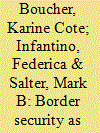

|
|
|
|
|
| Summary/Abstract |
The ambition of this special issue is to contribute to contemporary scholarly analyses of border security by bringing more focus onto a specific field of inquiry: the practices of the plurality of power-brokers involved in the securing of borders. Border security is addressed from the angle of the everyday practices of those who are appointed to carry it out; considering border security as practice is essential for shedding light on contemporary problematizations of security. Underscoring the methodological specificity of fieldwork research, we call for a better grounding of scholarship within the specific agencies intervening in bordering spaces in order to provide detailed analyses of the contextualized practices of security actors.
|
|
|
|
|
|
|
|
|
|
|
|
|
|
|
|
| 11 |
ID:
132334
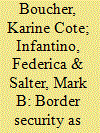

|
|
|
|
|
| Publication |
2014.
|
| Summary/Abstract |
The ambition of this special issue is to contribute to contemporary scholarly analyses of border security by bringing more focus onto a specific field of inquiry: the practices of the plurality of power-brokers involved in the securing of borders. Border security is addressed from the angle of the everyday practices of those who are appointed to carry it out; considering border security as practice is essential for shedding light on contemporary problematizations of security. Underscoring the methodological specificity of fieldwork research, we call for a better grounding of scholarship within the specific agencies intervening in bordering spaces in order to provide detailed analyses of the contextualized practices of security actors.
|
|
|
|
|
|
|
|
|
|
|
|
|
|
|
|
| 12 |
ID:
183923


|
|
|
|
|
| Summary/Abstract |
This study uses ethnography along Ethiopian women's irregular migration routes through Djibouti to analyse the complex reasons women leave home to seek labour opportunities in the Gulf States. Theories and policies that either narrowly depict women's motivations as economic in nature or focus only on women's needs for security and protection, fail to account both for the politics of seeking employment abroad, and the ways migration provides women a potential refuge from various forms of violence at home. Using a feminist analysis, we argue that women do not migrate only for financial opportunities, but also to escape combinations of domestic, political and structural violence. As such, irregular migration both evinces a failure of asylum systems and humanitarian organisations to protect Ethiopians, and a failure of the state to provide Ethiopian women meaningful citizenship. Lacking both protection and meaningful citizenship, international migration represents women's journeys for opportunity and emancipation.
|
|
|
|
|
|
|
|
|
|
|
|
|
|
|
|
| 13 |
ID:
183934
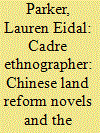

|
|
|
|
|
| Summary/Abstract |
Zhou Libo’s Baofeng zhouyu (Hurricane) and Ding Ling’s Taiyang zhao zai Sangganhe shang (The Sun Shines Over the Sanggan River), both written in 1948 and dual recipients of the Stalin Prize for Literature in 1951, were largely based on the authors’ own participation in the land reform movements of the Civil War. As socialist realist texts formulated through the ethnographic experiences of their authors – observation, fieldnotes, and first-hand accounts – these novels feature a geopoetics in which a new nation is constructed through the restructuring of its physical spaces. I analyze the land reform novels through their authors’ twin methods of knowledge production: an ethnographic approach to reconstructing the reality of land reform campaigns (the ethnographer) and the theoretical underpinnings of socialist realism as a narrative explication of the policy’s necessity (the cadre). The cadre ethnographer was an author who sought both to obtain knowledge and to effect a transformation of his object of study, a tension which in fact facilitated an embodied philosophy of history. As both inventor and chronicler, the cadre ethnographer reconciled the two halves of “socialist” “realism,” producing the method by which Maoist communism theorized its own historiographic authority as a narrative of socio-cultural transformation.
|
|
|
|
|
|
|
|
|
|
|
|
|
|
|
|
| 14 |
ID:
119986
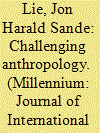

|
|
|
|
|
| Publication |
2013.
|
| Summary/Abstract |
Ethnography and anthropology are intrinsically linked, but recently other disciplines have started to draw inspiration from anthropological methods. The ongoing ethnographic turn in International Relations has spurred debate on what ethnography is, what it means and entails in practice, and how to apply it in International Relations. Some assert that the ethnographic turn could not have taken place without adopting a selective and antiquated notion of ethnography; others counter that this argument draws on a caricatured version of ethnography. This article offers one anthropologist's reflections on these issues, drawing on ethnographic work within an international organisation and a state apparatus - both of which are areas of study more common in International Relations than in anthropology. This is not an International Relations turn of anthropology, but the practical and methodological challenges it involves are relevant to the ethnographic turn of International Relations and the disjuncture between the ethnographic ideals and anthropological practice.
|
|
|
|
|
|
|
|
|
|
|
|
|
|
|
|
| 15 |
ID:
156083
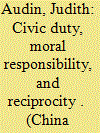

|
|
|
|
|
| Summary/Abstract |
This paper, which is based on ethnographic field research, analyses the system of resident-volunteers in the neighbourhoods of Beijing. Between co-optation networks, surveillance missions, ritualised practices, and ordinary exchanges of sociability amongst neighbours, volunteering is an interesting form of citizen participation in urban China. The volunteer networks are made up of inhabitants who are selected and involved through the norms of civic duty, personal acquaintance, moral obligation, or persuasion, in order to contribute to the production of local public order. Finally, this specific form of voluntarism reveals, from the perspective of retired people, how shared socio-political practices are created and perpetuated within an institutional volunteering system.
|
|
|
|
|
|
|
|
|
|
|
|
|
|
|
|
| 16 |
ID:
181812
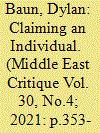

|
|
|
|
|
| Summary/Abstract |
Imad Nuwayhid (1944–1975) was a young Lebanese leftist intellectual, hotel employee, and fighter for the Lebanese Communist Party. Alongside thousands of others, he died during the first phase of the Lebanese Civil War (1975–1976). This article explores Imad’s life, death, and legacy through the methodology of ‘Microhistory.’ Consulting Imad’s writings alongside party sources, and conducting interviews with those who knew him, it serves as a window into the politics of memorialization in the Lebanese Civil War with a focus on the Lebanese Left. It argues that multiple actors, ranging from party to family members, produced Imad’s ‘martyr narrative.’ Like others of the era, regardless of party, the narrative stressed ideology and sacrifice over individuality to mobilize the living to fight. These strategies did not, however, unfold without resistance. In the case of Imad, some family challenged the party, positing counter-narratives and claiming Imad as theirs: a Nuwayhid. Their actions seek to restore Imad as an individual, but not always as he lived. These findings contribute to the literature on the Lebanese Civil War and its memory, providing a personal touch through a new and novel level of analysis: the individual, their sources, and the battle over memory that surrounds them.
|
|
|
|
|
|
|
|
|
|
|
|
|
|
|
|
| 17 |
ID:
172170
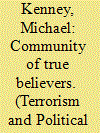

|
|
|
|
|
| Summary/Abstract |
This paper applies the concept of “communities of practice” to al-Muhajiroun (“the Emigrants”), an outlawed activist network that seeks to create an Islamic caliphate in Britain and the West through activism and proselytizing. Responding to recent studies on terrorism learning and adaptation, the author argues that focusing exclusively on the outputs of learning is unsatisfactory. Instead scholars should analyze learning as a process and unpack the causal mechanisms behind it. To support his within-case analysis, the author draws on extensive field work, including interviews and ethnographic observation. Newcomers to al-Muhajiroun learn the community’s norms and practices through repeated interactions with more experienced activists. These interactions take place in study circles and through companionship. Activists also learn by doing, preaching the Emigrants’ Salafi-Islamist ideology at da’wah stalls and protesting against the West’s “war on Islam” at demonstrations. The more they do, the better they become at performing the network’s high-risk activism, and the more deeply committed they become to its community of practice. However, far from allowing activists to adapt seamlessly to all challenges, the Emigrants’ insular and dogmatic community of practice creates its own problems, hindering its ability to innovate, expand, and thrive in an increasingly hostile environment.
|
|
|
|
|
|
|
|
|
|
|
|
|
|
|
|
| 18 |
ID:
104002
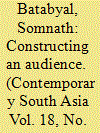

|
|
|
|
|
| Publication |
2010.
|
| Summary/Abstract |
This paper is an ethnographic exploration of two television news channels in India, Star News in Hindi and Star Ananda in Bengali, part of Rupert Murdoch's burgeoning media empire in the country. It seeks to answer a couple of basic questions: in the world of private television news, who are the news producers and who is their audience? Through these questions, the paper tries to understand some of the fundamentals of news business; the intricate links that exist between television ratings, target audience groups, the journalist's news sense and content. It examines corporate policies in television organisations, which in pursuit of advertising revenue not only curtail editorial independence, but editorial imagination. I claim that despite the proliferation of news channels across the country, the economics of the television industry enforces a unitary vision of an affluent nation; an India articulated by the privileged for themselves.
|
|
|
|
|
|
|
|
|
|
|
|
|
|
|
|
| 19 |
ID:
129978
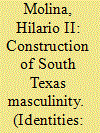

|
|
|
|
|
| Publication |
2014.
|
| Summary/Abstract |
I contend that masculinity formation in South Texas is linked to objects that have been deemed as 'manly'. This study is significant because it examines a group in the US population that, according to census predictions, account for a large percentage of the fastest growing and largest Latino group in the United States. This autoethnography research examines how pico de gallo - a type of salsa - and the barbeque grill assist working-class Mexican American males in constructing a masculine identity known as macho. The data are based on observing 30 social events in the Rio Grande Valley. The findings reveal a pursuit for an apex status of macho through these objects and the cultural transmission of gender roles to the next generation of males. This study concludes by offering suggestions in examining how masculinity, for men of colour, might be linked to marginalisation practices within a social structure.
|
|
|
|
|
|
|
|
|
|
|
|
|
|
|
|
| 20 |
ID:
168823
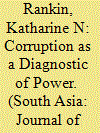

|
|
|
|
|
| Summary/Abstract |
In this article, we bring ethnographic insights from the contemporary moment of social and political transformation in Nepal to bear on troubling established understandings of corruption. We argue that corruption furnishes a productive site from which to interpret the relational space of state practice and to probe the ‘blurred boundaries’ of states, polities and markets in everyday lives. Reading corruption as a ‘diagnostic of power’, moreover, can help reveal intersecting and competing structures of power at work in ongoing processes of state construction and contestation. The argument is developed through an examination of three related and overlapping illustrations of public–private transgression, which we characterise as ‘impossible publics’, ‘consensus collusion’ and ‘patronage democracy’. Taken together, they speak to the diversity of practices commonly glossed as corruption, and their embeddedness in powerful mobilisations of affective communion and intimate relations of mutual obligation. We suggest in conclusion that engaging corruption as a diagnostic of power offers critical insights about the nature of, and possibilities for, distribution, political agency and planning. Overall, we make a case for the importance of disaggregating diverse practices of corruption in specific, socially embedded contexts in order to reveal possibilities for the meaningful redistribution of political power and opportunity.
|
|
|
|
|
|
|
|
|
|
|
|
|
|
|
|
|
|
|
|
|